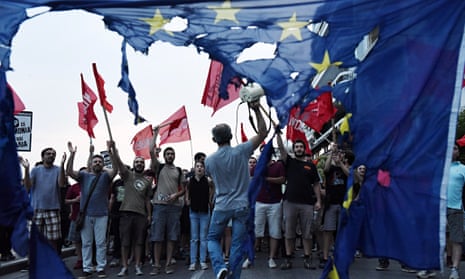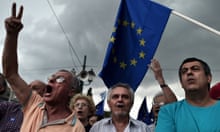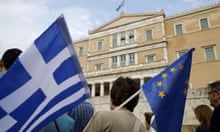Back in the autumn of 2011, I sat in an Athens restaurant with an old acquaintance, a cosmopolitan man who works in the arts. The crisis had begun to bite, though we had no idea then how bad it was going to get. We could hear chanting from Syntagma Square: there was a general strike against the first bailout memorandum. “I don’t feel close to those people,” my dinner companion said. “There’s a civil war going on. It’s not fighting in the streets – yet. But it will become like that. I don’t recognise those people as my compatriots.”
Greeks are preparing to vote in a referendum ostensibly on whether to accept the creditors’ latest conditions for extending the country’s bailout. But in these lurching, seasick days, everything is uncertain. Greek banks are closed; the markets are plummeting; Jean-Claude Juncker has declared his love for the Greek people. The bailout programme expires tomorrow; it’s not clear if the offer will even be on the table after that. And assuming we get to this vote on a no-longer-valid document, nobody knows what happens next if the country says no – or yes.
Either way, the polarisation is sharpening by the hour. If one thing has held the country together through its five-year descent into hell, it’s been the hope of a solution without rupture, the dream of a different Europe. People have clung to that hope though two elected governments – of the centre-left and the right – have fallen because they couldn’t enforce the creditors’ harsh measures. And while some who voted for Syriza in the election this January were ready to choose rupture, it was still that persistent hope that brought this government to power, on the promise of ending austerity inside the eurozone.
Syriza’s failed attempts to negotiate a compromise, clumsy and flawed as they were, have finally made it clear that the dream was an illusion: no such deal was ever forthcoming. As the last set of Greek proposals were returned like shoddy homework covered in red ink, even centrist commentators began to speculate that the creditors were bent on yet another regime change, or else a Greek exit.
So the egg has finally cracked in two, and the country is cracking with it. A fortnight ago rival protests began to demarcate the camps. The first, against austerity, was called by Syriza, though many people there were also critical of the party. The second – “We’re staying in Europe” – quickly took on the guise of an anti-government rally, attended and partly organised by opposition politicians, though many of those present loathe all of them equally. Greek social media are awash in sarcasm and vitriol; old friendships are stretched to breaking point. Under the pressure to align with one camp or the other, thinking becomes more difficult. For some the choice is obvious. Others feel torn apart, as if the faultline ran right through their own identity as Greeks and Europeans.
The split isn’t simple to map. It partly runs between classes: on the no side you’re likely to find the urban and rural poor, the unemployed, those from the middle class who have fallen furthest and have the least to lose. The yes side includes the wealthy, people with business or professional links abroad, young graduates and entrepreneurs. To some extent it cuts across political convictions, dividing those who believe Greece can survive outside the euro from those who think an exit would only spell disaster. And it also runs along mysterious lines of culture and family history, identity, local allegiance.
The no camp wraps itself in the rhetoric of nationalism, with its romantic narrative of heroic rebellion against a more powerful foe. When the referendum was announced on Saturday, minster after minister spoke of dignity, humiliation, heroism and pride. Asked by a journalist what a no vote would mean, the speaker of the house, Zoe Konstantopoulou, answered tautologically that it would mean “the historic no of the Greek people”. Symbolically, that’s the no of the dictator Metaxas when Mussolini asked permission to send his troops through Greece, the no of the left resistance to the Axis occupation. Panos Kammenos, defence minister and leader of Syriza’s rightwing coalition partner, Anel, took up the tune with relish: nationalism is the ground where left and right can meet.
What’s hidden inside that martial music in a minor key is the suffering of the last five years, the shame of poverty, despair at the thought of a future on minimal life support. The rhetoric is armour for that frightening leap away from the devil you know towards the devil you don’t – whatever might come next. Last week someone I’d only met as an acerbic voice on Twitter broke into Greek to tell me in a torrent of private messages about his fears for his children, about how his wife keeps startling in her sleep, about a father at the local school begging the head to feed his son because he can’t. We know what no will mean, he said. We just can’t take any more of this yes.
Under their thundering rage at Syriza, those who will vote yes are also afraid, not just of losing their privileges as some on the left would have it, not just of the deeper collapse that will surely follow default, but of being torn from Europe and the stability it’s meant, of being thrown back into the nightmare of Greek history. The tendency to blame Syriza for everything that’s gone wrong and the reluctance to criticise the creditors stems partly from that fear of the return of a violent past: the civil war between left and right that followed the occupation; decades of repression; dictatorship. Joining the EU in 1981 sealed the end of those terrible years. It meant democracy, enlightenment values, connection, human rights. The money that flowed in hid the wounds of the long civil conflict.
Not many people imagined it would really come to this. But it has, and unless there’s a miracle, an awful choice has to be made: years of slow asphyxiation or a leap into the deep blue sea. There’s no way to predict what will happen in the referendum, if it goes ahead. Europe was once a continent, a culture, a tradition. In an effort to end its internal wars, it became a members’ club. Now it’s behaving more like Europe plc, putting numbers ahead of people, driving the wedge ever deeper into its own heart. Like the tiny figure at the bottom of Pandora’s box, a secret hope remains: perhaps Europe will learn something from this catastrophe. Greece, though, will remain divided for many years to come.








